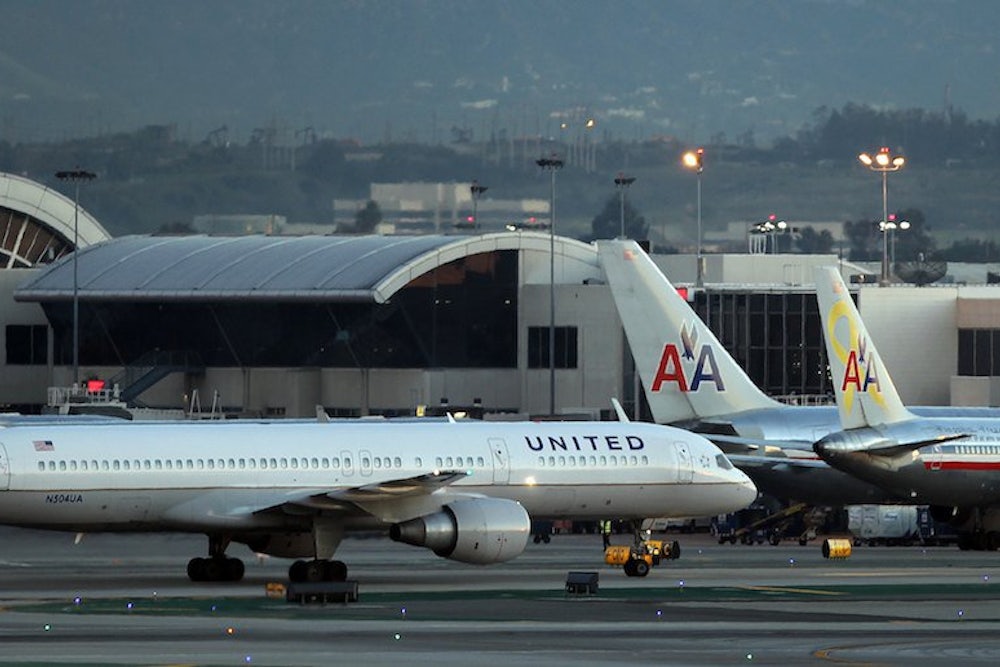Forget Bill de Blasio for a moment (which may be hard for Peggy Noonan to do, given how exercised the Upper East Side columnist is about her new Park Slope mayor.) The first 2014 battle in liberalism’s newly declared war on income inequality was fought not in New York but on the other side of the country, in the Puget Sound around Seattle. And the results weren’t pretty.
In November, by a 2-1 margin, unionized Boeing machinists in Washington state voted down a contract proposal from the company that included freezing their pensions in favor of less generous and riskier 401(k) plans, increasing their out-of-pocket health spending and limiting raises to just 4 percent over the contract's eight-year term. Boeing promptly threatened to move the assembly of its new 777X aircraft to a state with anti-union right-to-work laws, and received no shortage of offers of states eager to provide incentives and bargain-basement labor. Boeing offered the Puget Sound workers a slightly revised contract that reversed a proposed change in the length of time it would take workers to achieve the top wage, but kept the most objectionable elements, including the pension freeze. Boeing’s hard line could hardly be justified by hard times: it is enjoying huge profits and a record $400 billion backlog in orders and two weeks ago raised its dividend by some 50 percent and signed off on a $10 billion stock buyback. Oh, and its CEO Jim McNerny’s total compensation is somewhere north of $20 million.
This set off a tense debate in the Seattle area, where the potential loss of 10,000 manufacturing jobs was set against heightened awareness about the problem of income inequality and middle-class stagnation (Seattle has become a main front in the push to sharply increase the minimum wage.) It also set off a debate within the International Association of Machinists, with the union’s national leaders, worried about losing the $25 million in annual dues from Boeing’s 31,000 unionized Puget Sound workers, urging members to accept the revised deal, and the union’s local leaders arguing that the deal was too lousy to take.
Making matters more intriguing was the Obama angle. One might expect the president to be squarely on the side of the union, given his increasingly outspoken worries about the growing imbalance between corporate balance sheets and middle-class wages. In 2009, his administration sparked a furor by seeking to block the move of another Boeing production line, for the 787 Dreamliner, from Washington state to right-to-work South Carolina. But the personal dynamic is more complicated than that episode might suggest. For one thing, there is no love lost between Obama and machinists’ national president, Tom Buffenbarger, who famously had this to say about Candidate Obama during the 2008 primaries, when Buffenbarger was a Hillary Clinton man:
Barack Obama is no Muhammad Ali. He took a walk every time there was a tough vote in the Illinois State Senate. He took a walk more than a 130 times. That's what a shadow boxer does. All the right moves. All the right combinations. All the right footwork. But he never steps into the ring…Hope? Change? Yes We Can? Give me a break! I've got news for all the latte-drinking, Prius-driving, Birkenstock-wearing, trust fund babies crowding in to hear him speak! This guy won't last a round against the Republican attack machine. He's a poet, not a fighter.
Meanwhile, Obama has been trying for a while now to make nice with Boeing CEO McNerny, going so far as to name him the head of his new Export Council in 2010.
It was in this fraught context that thousands of Boeing workers gathered Friday to vote on the revised contract. And it passed—barely, with 51 percent of the vote. “I don’t ever want to gamble. I’ve got a family to take care of,” said one mechanic quoted by the Seattle Times, giving voice to the American worker's loss of leverage. “I just think at my age, there’s more ways to invest in my future. I’m not stuck on pensions just to say ‘no’ to Boeing and watch them leave. There aren’t a lot of jobs out there I can find that match Boeing.”
So Boeing will put the 777X assembly in the Puget Sound, pocketing $8.7 billion in new tax incentives from Washington state, saving untold millions in labor costs as a result of the new deal and establishing yet another major marker on the graph that has seen workers’ share of corporate gains steadily eroding. Who’s to say what the right vote was for the workers and the Seattle area, given the company’s threats—the Seattle Times couldn’t even bring itself to make a judgment in its milquetoast editorial on the matter. But this chapter should serve as a wake-up call to Obama, Bill de Blasio and other Democrats intent on doing something to reverse rising inequality, stagnating wages and falling economic mobility. The speeches are fine and good, and some solutions are straightforward, such as pushing for a higher minimum wage.
But to really address the underlying trends will also mean taking on the more fundamental forces that lead to an outcome like we just saw in the Puget Sound: strengthening labor laws and unions in right-to-work states to weaken employers' race-to-the-bottom threats to move south; raising taxes on upper incomes and capital gains to slightly rebalance the equation between the McNernys of the world and their flush investors on the one hand and their overmatched workers on the other; and, perhaps most difficult of all, changing the norms for acceptable behavior by corporate titans, even if they've been named to the presidential exports council.
Something to think about as you sit on the tarmac waiting out a winter-travel delay on a plane made by workers at a company that just froze the pensions that the workers’ forebears enjoyed for decades.
